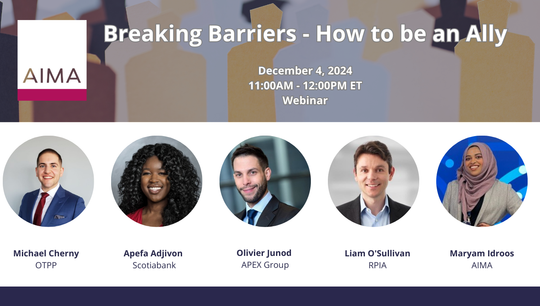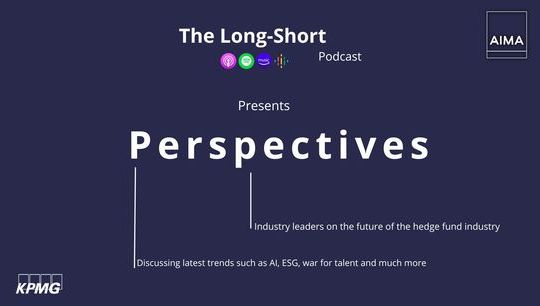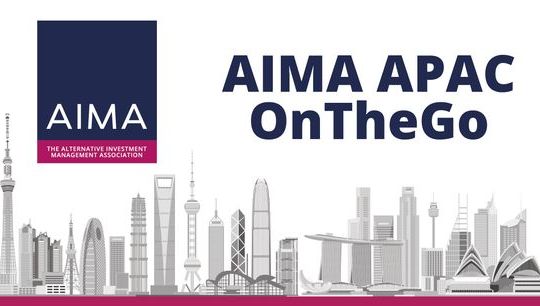Ep. 46 The Long-Short | ICYMI: Kickstarting a Career in Hedge Funds
Published: 16 November 2022
The Long-Short is a podcast by the Alternative Investment Management Association, focusing on the very latest insights on the alternative investment industry.
Each episode will examine topical areas of interest from across the alternative investment universe with news, views and analysis delivered by AIMA’s global team, as well as a host of industry experts.
Why is now a good time to join the global hedge fund industry and where do I start? This week, The Long-Short revisits a conversation with the authors of AIMA's careers guide, Katherine Abrat, COO of Arkkan Capital, Eleanor Davidson, Quantitative Researcher at Aspect Capital, and AIMA’s Aniqah Rao.
In the episode, our guests drop the veil on the numerous entry routes to launching a career in the hedge fund industry, and the limitless potential within.
Jump to episode 28 to listen to the full conversation.
Listen to this episode and subscribe on Spotify
Listen to this episode and subscribe on Apple Podcasts
Listen to this episode and subscribe on Google Podcasts
Listen to this episode and subscribe on Amazon Music
Read the transcript
Hosts: Tom Kehoe, AIMA; Drew Nicol, AIMA
Guests: Katherine Abrat, COO of Arkkan Capital; Eleanor Davidson, Quantitative Researcher at Aspect Capital; Aniqah Rao, Associate – Markets, Governance and Innovation at AIMA
Tom Kehoe, AIMA 00:05
Welcome back to The Long-Short. Listeners of this podcast will recall a conversation that we had with Robin Grew in Episode 19, who in addition to her role as General Counsel and Chief Operating Officer of Man Group, also chairs AIMA’s DE&I (Diversity, Equality and Inclusion) steering group. And by way of a brief recap, the goal of this steering group is to provide practical resources, advice put forward industry role models and case studies to enable alternative investment firms to develop a culture which embraces difference and to hire and retain a more diverse and inclusive workforce.
Drew Nicol, AIMA 00:37
The steering group has been responsible for a number of important initiatives in recent years. Among these is AIMA’s ‘EY - The Alternatives’, a paper containing practical steps that firms of all sizes can take to improve DE&I, which we published in 2019. The following year, saw us collaborate with Albourne Partners to produce a DE&I due diligence questionnaire, which is available to both members and non-members who are looking to explain their approach to DE&I. While last July saw the publication of ‘How to be an Ally’, providing practical examples as to how you can become a good ally to your colleagues and your firm.
Tom Kehoe, AIMA 01:13
That's right Drew. And related to the DE&I group, AIMA also has a careers network, launched in 2020, which provides a forum for individuals across the alternative investment space to help connect, find mentors and develop the skills necessary to further their careers.
Drew Nicol, AIMA 01:31
This group has been particularly active during the past few years, with representation from young career professionals through to more senior industry people.
Tom Kehoe, AIMA 01:39
And like any show out there, they have a book to tell us about or a guide, ‘Kickstarting a Career in Hedge Funds’, which is freely available now to download on the AIMA website, www.aima.org.
Drew Nicol, AIMA 01:53
And joining us today are three of the contributors to this guide. We are delighted to be joined by Eleanor Davidson, a quantitative researcher at Aspect Capital, Katherine Abrat, COO of Arkkane Capital, and our very own colleague Aniqah Rao AIMA. You're all very welcome to The Long-Short.
Aniqah Rao, AIMA 02:11
Hi, it's good to be here.
Eleanor Davidson, Quantitative Researcher at Aspect Capital 02:13
Hi. Nice to be here.
Tom Kehoe, AIMA 02:15
So, let's start then, with this new guide, as mentioned, we have it out on the AIMA website. Can you briefly explain what the guide is about? And why have we decided to publish this now?
Aniqah Rao, AIMA 02:28
Sure. So, the guide is aimed at helping students, graduates, and career changers, to really understand the global hedge fund industry. It covers everything from what a hedge fund is in the first place, and the growth and future of the industry, to the types of job roles at a hedge fund manager and also the professional services firms that support the industry. So, fund administrators, accounting firms, and law firms. And then we also shed light on the ways that people can enter the industry and the types of skills that aspiring hedge fund professionals should seek to develop. And then finally, we also include some recommended reading. So not just on the industry, for commercial awareness, but also on personal growth, which is really key to what the careers network is all about. And we also include a list of social mobility organisations and industry initiatives all around the world. I know that sounds quite dense, but it's not all facts and figures.
To your second point, I really wanted to share the stories and lessons of those working in the industry and bring the guide to life. Just taking it back, my inspiration for the guide came about after I set up AIMA’s careers network for hedge fund professionals. We were holding introductory gatherings for the network's various subgroups, and during our gathering for the early professionals, so being recent graduates, and those with up to five years of experience in the industry, I just couldn't believe how many there were. And each working in a different area from technology and operations to investment research and HR. And for the first time, I just saw how diverse and creative the industry is. And that was just one subset of the network. So, we went around getting to know each other, sharing what we studied at school or university, how we came to learn about the hedge fund industry and what our goals were. And I just thought, you know, wow, this is really powerful. I was learning about roles that I never knew existed, qualifications, I didn't realise the value of, and I even work with hedge fund professionals on a daily basis, you know, so just imagine how many people could feel inspired in a similar way? And how much could change if we provided that access and gave more people a chance to learn what I learned. So, the guide attempts to do just that. Share some of that, you know, raw buzz, and I guess the magic of people's journeys through the industry during cooperating conversations with around 50 hedge fund professionals around the world.
Drew Nicol, AIMA 05:07
And turning to you Eleanor, what led you to a career in the hedge fund industry? Because I know, for example, that I didn't know a lot about hedge funds when I was at school, and I know there isn't a lot of information out there. Did you know that this was a job for you from a young age?
Eleanor Davidson, Quantitative Researcher at Aspect Capital 05:25
I definitely didn't. And I actually didn't have a completely direct route in. I studied maths at university, which isn't uncommon in my area. In quantitative research, there are a lot of people from STEM backgrounds. But whilst I was at university, as everyone said, I really hadn't heard anything about hedge funds, or all the variety of roles within them. But what I did hear about was the banks, because they often have far larger graduate schemes and internships, or a much larger presence at careers fairs, at university. So, I ended up getting a summer internship in an investment bank in mergers and acquisitions, which is very different from what I do today. And then I got a graduate job in the same team off the back of that, but it was while I was working in the bank, that my eyes were really open to other areas of finance that I really hadn't been aware of before. Because when you're working, you get to know the things that you like and don't like about your particular role. And you come into contact with a lot of different people.
For me with a math background and computer programming experience, people started asking me, why aren't you a quant? And then I learned more about, you know, quantitative and technical roles within the finance industry. And then I started thinking as well actually, why aren't I a quant? So, it was after about a year in the bank that I decided to make the move over to a systematic hedge fund. And it's certainly much better suited to me, to not just my skill set, but also I think, my personality. But what I've realised is, a lot of people in this industry have done a whole range of roles. And there isn't really kind of a standard route in or up. And there are just so many different opportunities available and everyone will find their own path
Tom Kehoe, AIMA 06:59
You mentioned you're working in the quantitative space and working with numbers. What does your typical working day look like?
Eleanor Davidson, Quantitative Researcher at Aspect Capital 07:09
Yeah, as people often unhelpfully say, each day is a little bit different. But as a quantitative researcher in a systematic hedge fund, my job is to develop and maintain our mathematical investment models. So, the way we trade we don't make decisions ourselves as a person of what to buy and sell, we build models, which make those decisions for us. So, in terms of my day-to-day role, at any time, I tend to be working on one or two longer-term projects covering either kind of signal generation or portfolio construction. So, for example, I might start out with a new data set, and some sort of hypothesis of how that data might be used to predict subsequent market moves. And then day to day, I'll be coding up experiments to test the hypothesis and better understand how we can harness anything we find in a practical way into our trading models. And you really have complete autonomy, over your research projects, you really have ownership of them from day one. But at the same time, it's a very collegial atmosphere with a lot of collaboration and guidance from everyone in the research team. And also, a lot more creative thinking than I had expected. I really liked that part of it, you know, coming up with new ideas or improvements for our models. And in every project, even if it doesn't end up going into production, you always learn something from it and really deepen your understanding of the way markets are behaving.
Drew Nicol, AIMA 08:39
Catherine, if we could bring you in at this point, being more experienced in the industry? How would you say that the hedge fund industry has changed during your time?
Katherine Abrat, COO of Arkkan Capital 08:50
Thanks, Drew. Well, I would say particularly, we've matured, and we've matured in many, many ways. First of all, we have the depth of field and breadth of field in strategies. So, when hedge funds first came onto the scene, particularly in my part of the world, when all of my career has been built in the Asia Pacific, hedge funds really were about trading equities. And they were about fundamental, long-short equity strategies because those were the products that were available in the marketplaces where some liquidity existed, aka Japan, Hong Kong, Singapore, and Australia, back in the day. That has evolved significantly to the point where you're speaking to Eleanor about how her experience mathematically and how that translates into a hedge fund role. When I first started working in hedge funds, that role just didn't exist. These days, the range of roles is because hedge funds as asset managers are maturing, and they're better at asset gathering. They're better at-risk management. They're better at platform building. All of those roles and features are available in a way that didn't exist, at least when hedge funds were really about traders and former traders, leaving banks or leaving other asset management platforms to do their own thing in a small business,
Tom Kehoe, AIMA 10:11
Katherine, do you believe that now is now a more exciting time to be part of this industry?
Katherine Abrat, COO of Arkkan Capital 10:19
I do think that now is an extremely exciting time for people to join and continue to be a part of this industry. And the reason for that goes back largely to the answer to the earlier question, which is that we're more mature. Now, as an industry, there are so many more roles than there were even 10 years ago, in the hedge fund industry, as we develop in size and complexity as a segment of the asset management industry. So, whether you are looking for a role in a portfolio management type role, trading execution, or risk, or as a lawyer, in marketing, or investor relations, there are so many roles, and there's so much that people can get involved in across these more complicated platforms that I think it's a very exciting time for young people who are looking to grow their careers.
In addition to that, the complexity of the macro environment is throwing up so many opportunities. You've seen the hedge fund industry develop from being largely equity long-short, in the early days of my involvement 20 years ago, to being very product diverse. And some of the new markets that didn't exist for certain products, at least even 10 years ago, such as in China, in India, are now providing opportunities that are really unique, and give people a really good ability to do something new, innovative, think differently, and create a real place for themselves in the asset management community. When I also think about how the market has evolved, I look at that macro-opportunity set on a going-forward basis and think, wow, this is a very volatile time in society. The US hedge fund market came through 2008 with big changes in regulation following the global financial crisis, and a period of sustained effective inflation to the point now where the Fed has announced just in the last 24 hours, they're going to pull back from some of the quantitative easing to a more tightening mode, that's going to create volatility and change the opportunity set even just in US markets over the next three to five years. The same can be said of the post-COVID era, in places like China, in places like Europe, look at the dislocation going on from the Russia-Ukraine conflict at the moment, there's an enormous amount going on in the macro environment itself that I think creates a very interesting and unique investing environment for those who want to be in this alternative space going forward.
Drew Nicol, AIMA 13:14
It's interesting that you used the word ‘maturing’ there because I know when we were doing the research for the ‘Gaining an Edge’ paper, we spoke to many industry professionals who used the same word when they were describing how the industry was forging new paths to talent pools that maybe hadn't been on the radar of hedge funds in years gone by. And as the industry develops, these new roles come about, and the industry opens up to new markets and geographies. The need for new skill sets and people from different backgrounds is becoming all the more apparent. And it seems to be like the industry was moving in the right direction. But I wondered if you agree?
Katherine Abrat, COO of Arkkan Capital 13:58
Yes, true. I would agree with you in that regard. For many of the same reasons I just mentioned, we've got bigger businesses, we've got more complicated markets with more complicated access points, and more complicated product sets. And therefore, you need a more diverse range of skill sets to access them. At the same time importantly, to your question, we're in more markets around the world as well as an industry. And that means you need cultural backgrounds that are different. You don't just need someone that grew up in a major investment bank in London or New York or San Francisco. It means you need language skills that go along with that. And all of those things then contribute to the profile of the individuals you want and need in your organisation to give you access to the right information that allows you to make those good arbitrage choices that I mentioned earlier. So, a great example of this in the Hong Kong industry is the growth of China. When I started lawyering for hedge funds, there was no hedge fund industry in China, it literally didn't exist.
In fact, when I started lawyering for asset managers, there was barely even a long-only asset management industry in China. Fast forward to around about 2010, and we started seeing the rise of the onshore PFM, private fund manager, in China, which was a brand new concept that didn't exist as a matter of regulation, but existed because economic opportunity existed, that then spurred on firms from China to go offshore and get regulated. They needed to hire; they brought people with them who were natural Mandarin speaking Chinese educated folks who built into this industry outside of China. So, I can say, with some conviction that I have seen the growth of a diverse range of individuals in our industry, in a very organic manner. Because there was money to be made, there was an opportunity to be had in a new industry. And when you snowball that effect over a 15-year period, you see people start to infiltrate and get into roles in all sorts of places that you would not have otherwise seen. And I think you can broadly say the same thing for women in our industry as it's grown as well.
Disclaimer
This podcast is the sole property of the Alternative Investment Management Association (AIMA). This audio production and content are intended as indicative guidance only and are not to be taken or treated as a substitute for specific advice, whether legal advice or otherwise. AIMA permits use or sharing of the content in media or as an educational resource, provided always that proper attribution is made. The rights in the content and production, including copyright and database rights, belong to AIMA.










